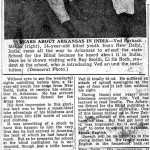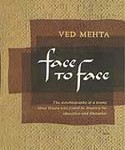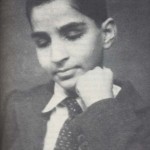An Island Gift
The distinguished author Ved Mehta, 69, looks uncomfortably out of place in his summer home on the Maine island of Islesboro. A consummate urbanite, he is dressed in light-blue blazer, gray slacks, and gray shirt. His only concessions to country life are removing his tie and replacing his black leather shoes with blue canvas ones. He walks slowly, cautiously from the kitchen table to the coffeepot, feeling his way. His hands tremble as he pours a fresh cup for himself and returns to the table.
The kitchen of Mehta’s summer home has a spectacular prospect of East Penobscot Bay and the litter of islands from Deer Isle to Isle au Haut, but Mehta can’t see the million-dollar view, because, as anyone who has ever read one of his books or his New Yorker pieces knows, Ved Mehta is blind – the result of contracting spinal meningitis as a boy of almost 4 in his native India. Still, there are folks on Islesboro who do not believe that Mehta is really blind, because they remember seeing him ride a bicycle along the island’s crowned, narrow, shoulderless roads 20 years ago. But then Ved Mehta is a writer famous for refusing to accommodate his blindness, either in print or in the conduct of his life. As he explains in Dark Harbor: Building House and Home on an Enchanted Island (Thunder’s Mouth Press/Nation Books, 2003), the 10th and latest volume in his autobiographical Continents of Exile series, Mehta rode a bicycle back then in order to impress Linn Cary, the woman he was courting and would marry in 1983. “I wanted to prove to her that I was able to do things a seeing person could do, and so was worthy of her,” he writes.
As a staff writer for The New Yorker from 1961 until 1994, Ved Mehta became famous for seeking universal truths through the close examination of the particulars of his own life, being one of the chief practitioners of the New Yorker form of personal history. In Dark Harbor, Mehta explains how he set about to build a house and ended up building a family as well.
“The house was the perfect metaphor for getting married and having children,” says Mehta. “In a way, marriage is a dark harbor itself, with all of its joys and disappointments.”
Mehta first came to Dark Harbor, as the exclusive Islesboro summer colony is known, in 1968 as the houseguest of Annette Engelhard Reed, daughter of Charles William Engelhard, the gold baron said to be the model for Ian Fleming’s Goldfinger. Typically unsparing of himself, Mehta relates in his book how, on a seaside picnic, he stepped on a nest of yellow jackets, the insects’ fiery stings persuading him that he had stepped in a campfire:
“The sea was somewhere behind me, crashing and churning.
“Water, I thought, and made a dash for it, almost somersaulting into the sea. Even though I was practically up to my neck in icy Maine water, the burning on my leg did not seem to abate.”
In 1981, 13 years after his inauspicious introduction to Dark Harbor society, Mehta returned to Islesboro for another visit and the following year purchased a parcel of land in partnership with Annette Reed, who eventually divorced and became Mrs. Oscar de la Renta.
The house that Mehta built on his 15 waterfront acres was a distinct departure from the Shingle Style arks of old-money Dark Harbor. Designed by noted architect Edward Larrabee Barnes, the Mehta house is a fusion of modernism and regionalism, a tall, shingled structure that resembles a boathouse marooned high and dry on the wooded shore. A geometry of rectangular, square, triangular, and semicircular windows admits volumes of light and air to a stark white interior appointed with rugs, drapes, and furniture of muted tones. The house does not reflect Ved Mehta’s life or personality at all, nor, in its precipitous site and frequent level changes, does it make any concessions to his blindness. And that is the way Mehta wanted it.
“It was as if I’d created the house, the swimming pool— indeed, the whole private campus, as it were—for others to see and enjoy,” he writes in Dark Harbor, “as a monument to my ability to visualize, to be as good as Everyman.”
Mehta spends his days in Dark Harbor as he does in Manhattan, writing from 9:30 a.m. to 5:30 p.m., dictating to an assistant, listening while she reads back what he has written, then revising endlessly. And that’s pretty much how he edited Barnes’s design.
“For me, the house was like a book. I can’t be defeated by a book. It had to get done,” Mehta explains. “I thought of Ed as an author. Just as I don’t want an editor to tell me what kind of a piece to write, I didn’t want to tell Ed what kind of a house to design.”
Thus, for many of its 272 pages, Dark Harbor becomes an earnest chronicle of the vicissitudes of design and construction—replacing the original Maine architect with Barnes, relocating the site, repairing the leaky foundation, eventually building a major addition to make the whole house more livable for a family.
For as its subtitle suggests, Dark Harbor is as much about how a middle-aged bachelor came to marry a woman 22 years his junior and become a family man as it is an exercise in design review. The Mehtas share their home with daughters Sage, 18, and Natasha, 16, and ultimately, Mehta came to realize, the Maine house was more for them than it was for him.
“From my point of view, it’s not been worth it at all,” he says frankly. “When I come here, I write from 9:30 to 5:30. No tennis, no golf, no sailing, the water is too cold for swimming, and I can’t go around openly all by myself. What I like here is the air. But for my children, I don’t think I could have given them a greater gift than Maine and the island. Here, every morning they get up and go. They go to sailing class. They go to play tennis. They love it. That’s why I kept this house.”








